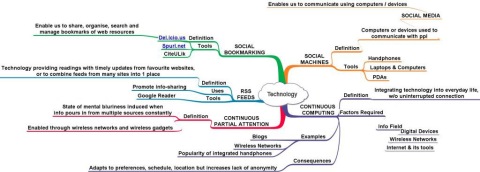pay attention to attention
credits: ™gerlynn
the mind map above sums up what we discussed during one of the in-class seminar sessions led by my classmates.
because i thought the line between multi-tasking and continuous partial attention was a bit murky, i did some research of my own. before we had this class discussion, i thought the term continuous partial attention was familiar, and then i remembered it was mentioned by Pat Law, who was a guest lecture last week. she said our attention is divided as information (in the context of the use of social media) pours in.
this is further explained by the original creator of the term, Linda Stone. She says “to pay continuous partial attention is to pay partial attention – continuously”. She points out there is a new trend in which one will select technologies that protect us from too much clutter or “noise” and enable us to focus on rich experiences, relationships and information.
in other words, continuous partial attention is about filtering information, and the better you are at filtering when you are required to really pay attention, the better you are at processing information.
so is that good?
i can only think that continuous partial attention means that one gets better at scanning through information and identifying which is relevant and which isn’t. so you get your work done faster, as you try to maintain and maximise the benefit out of the information.
author steven berlin johnson describes one form of multi-tasking as “skimming the surface” of the information, and picking out the relevant details. he says, “you are paying attention, but only partially. that lets you cast a wider net, but it also runs the risk of keeping you from really studying the fish”. this is what Linda Stone coins as “continuous partial attention”.
however, what’s the difference between multi-tasking and continuous partial attention?
they are both motivated by different impulses. how so? when we multi-task, say, we eat bread and e-mail. we make the bed and talk on the phone. excuse the shabby analogies. with multi-tasking, one or more activities is somewhat “easy, or “reflex” or automatic. take ‘eating bread’ and pair it with another activity that requires more attention and cognition, like ‘writing e-mail’. when we multi-task, we are motivated by a desire to be more efficient and more productive.
however, when we pay ‘continuous partial attention’, we are motivated by a desire not to miss on anything. there’s a differentiating element that set ‘multi-tasking’ and ‘continuous partial attention’ apart’ – a characteristic vigilance that’s only present in continuous partial attention. we are always high on alert and we always strive to prioritise, while at the same time, scanning the terrain if we are missing other information. it’s like, we’re on the ‘live node network‘. always-on, and always wanting to stay connected.

Hahaha, I shall save your picture and use yours instead. How did you do it??
i used the eraser tool on photoshop. im not taking credit though, haha. it’s still your mind-map. im just correcting the typo
Hi Maisara, thanks for sharing this post! CPA is my great learning of today. I was not aware of this concept previously, but, in real life, it is increasingly becoming my mode of operation. Always trying to keep on top of everything or rather, in your words, ‘a desire not to miss anything’. Is this an obsession? Bordering on it, I believe. But awareness is key to greater learnings ahead, so I am not too concerned, just got to get better at CPA 🙂
Have a great day!
hey, thank you for taking the time to read and actually bothering to comment on it, considering the number of comments in my blog doesn’t justify the number of hits i get on my wordpress, haha! people on my twitter just visit, and that’s it.
i guess this ‘desire not to miss anything’ is also brought about by the fact that we’re always “hungry” for information, etc etc. we always want to stay abreast of things. can’t really help it, can we? 😉
have a good one too!
I think we all need to adapt ourselves to optimum filtering so that we can process as much information as we can. A better excuse to multitask, I should think :p